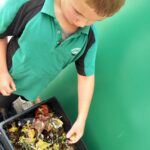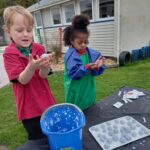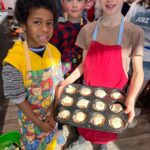Maheno School in Ōtākou has grown from strength to strength as they have developed their Enviroschools programme from a small group to a whole school approach. The staff, Board of Trustees, Home and School committee, community and whanau have all helped to ensure the success of this programme through enthusiasm, energy, engagement and support for resourcing. Alison Thompson, Kaiako at Maheno School, shares their story..
Starting our Maheno Enviroschools journey coincided with a period of roll growth and stretched finances, with our Board of Trustees providing extra funding until we finally met MoE target numbers and became a 3-teacher school with around 52 students.
At first our Enviroschools group was a small group of children who opted into the programme. There was dedicated time on a Friday when these children could work in the gardens, harvest and cook produce or work on other environmental initiatives while the rest of the school did buddy reading and other activities.
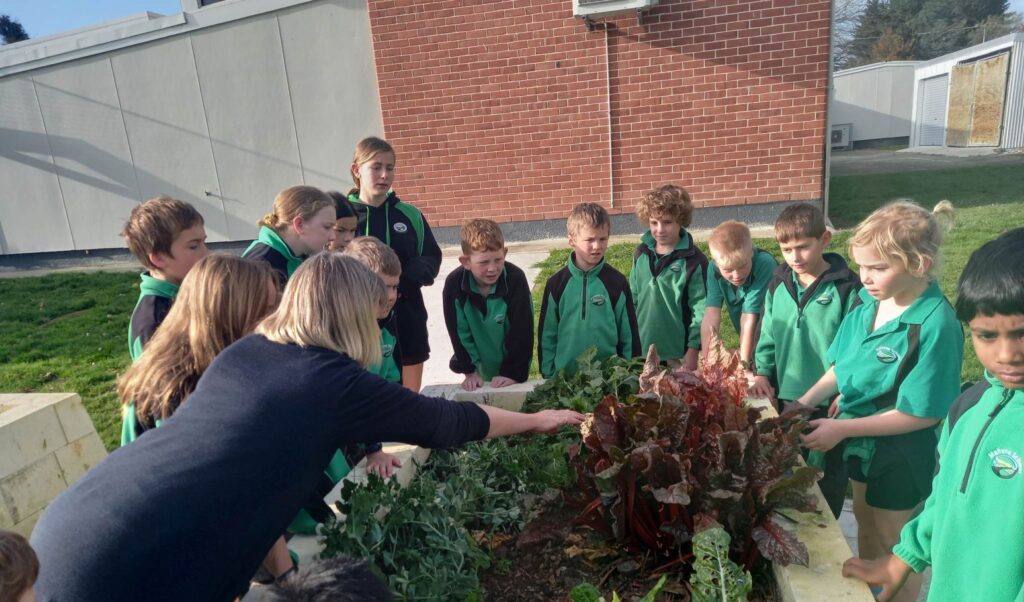
The gardening group grows a range of produce in our school gardens and also looks after planted areas around the school.
Soon our group got bigger and bigger as more and more children wanted to be part of the action and change at our school. Eventually there were more children participating in the enviro programme then not, and most of those not participating were the junior children. Numbers were getting difficult to juggle to accommodate the hands-on learning that the children loved and expected.
Shifting to a Whole School Approach
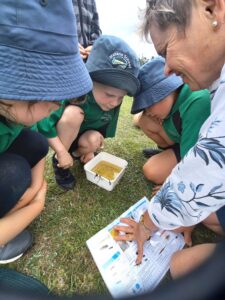
Students learn about the health of local waterways.
In 2021-2022, as a staff we decided to reconsider how we managed our growing Enviroschools programme numbers and also to ensure that any enviro initiatives, ethos and action that was being taken would be school-wide, rather than just amongst a group of enthusiasts.
It was decided that we would split the children into five groups – four mixed age whānau groups for children aged Year 3 to Year 8, plus a junior enviro-group for the Year 0 – 2 students.
Learning and Action
The children in the mixed-age whānau groups rotate around four activities each term with two weeks at each before changing over to the next. The groups are:
- Gardening group
- Enviro-learning group
- Action Projects
- Cooking group
- Feeding the worms. A previous action project included fixing up the worm farm after the Covid era of neglect.
- Enjoying the textures of paper balls.
- The cooking group generally make something savoury and something sweet. Where possible we use produce from the garden, or donated goods from our community
The junior enviro-group take part in activities based on the 5 Guiding Principles of Enviroschools – Learning for Sustainability, Sustainable Communities, Te Ao Māori, Respect for Diversity, and Empowered Learners. Two senior students help with this group so we can do hands-on learning as much as possible. We often learn about the cultures of the children and families within our school, and it is great to see respect and understandings about others grow while also seeing the mana of the families involved increase as they get to share their culture.
Integration across the curriculum
The best thing about our Enviroschools programme is the opportunity for integration across the curriculum. Most especially for this integration to be meaningful and for it to be in a real-world context.
- Cooking involves recipe reading and comprehension, following instructions, measurement and fractions, learning how to be sustainable with food.
- Gardening involves planning, soil and plant science, counting, following instructions, managing resources, measurement.
- Action Project involves reading and researching, writing emails and letters and making phone calls, measuring, planning.
- Enviro-learning focuses on the science but also incorporates research, facts and opinions, experiments and observations.
- Junior enviro-group incorporates reading and listening to stories, gathering facts, presenting information, art and creativity, science learning and so much more.
Our Enviroschools times are also a great time to practice our key competencies and values as we work together for a variety of outcomes.
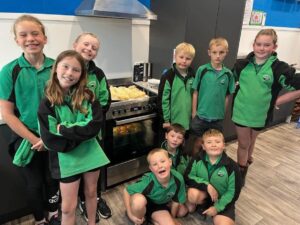
Cooking up great kai in the new kitchen. Our Board of Trustees saw the benefit of upgrading our kitchen space and used MoE building funds to turn two old storerooms into a large kitchen and learning support space.
In conclusion, the whole school approach to Enviroschools has meant that everyone at our school is onboard and are included in projects and initiatives and everyone is active in caring for our environment. We finally got around to reflecting for bronze last year and are on our way to re-reflecting, sharing and celebrating again this year. In this time our roll has also grown from around 52 to 85+, which has also created challenges and financial stress.
Involvement from our staff, community, families, Home and School committee, Board of Trustees and grant providers has been key to helping our Enviroschools programme grow alongside our wonderful students. We feel our students get a lot out of being an Enviroschool – on top of new skills they also develop competencies and values and knowledge about the world around them.



